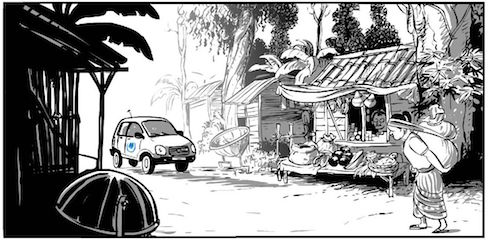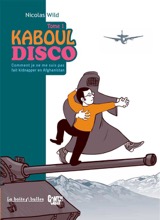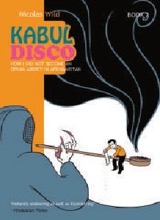Nicolas Wild
1977-
Country: France

| [Link here] [Any errors, omissions or comments? Please mail to: european.comics@gmail.com] |
Nicolas Wild1977- Country: France |  |
| Kaboul Disco | |||||
| 1 | 2007 | 145p. |  | Comment je ne me suis pas fait kidnapper en Afghanistan | Art & Script: Nicolas Wild |
 |  |
By: HarperCollins ISBN: 9788172239176 (148p.) (2009) Format: Softcover Buy this from: amazon.com In 2005, Nicolas Wild, a wandering French writer, found a job and somewhere to live at the same time. The only problem was that the place was Kabul, in Afghanistan, a country left unstable after several destructive years of war. When the carefree young man arrived at a capital in crisis, his first mission was to write a comic book explaining the Afghan constitution to children. His second project was to work on a recruitment campaign for the Afghan army. Consequently, he became a privileged observer of the hesitant reconstruction of the country whilst leading the unusual life of a Western expat in Kabul. Gradually, he fell in love with the country and decided to extend his contract despite the risks of living in Afghanistan. Honest and perceptive, inquisitive and unsettling, this book casts an ironic yet affectionate look at the realities of a country that never strays far from the headlines. | |||
| 2 | 2008 | 156p. |  | Comment je ne suis pas devenu opiomane en Afghanistan | Art & Script: Nicolas Wild |
 |  |
By: HarperCollins ISBN: 9789350295991 (176p.) (2013) Format: Softcover Buy this from: amazon.com Nicolas Wild return from a holiday in France to resume work as an illustrator. Nicolas is assigned to the agency's new programme: an awareness campaign against opium. Wild draws a vivid portrait of a surreal situation: the farcical nature of the message, an election where no one votes and the yo-yo that is expat life in Kabul, swinging as it does between ever-present danger and casual festivities. Irreverent and funny, Kabul Disco continues to monitor the Afghan crisis serving both as historical documentation and the memoir of a keen-eyed observer. | |||